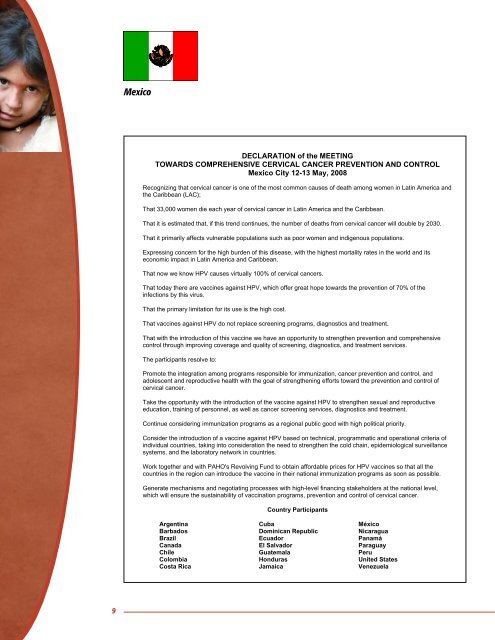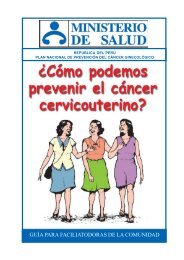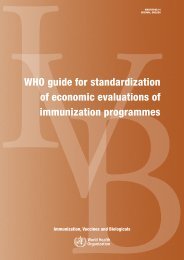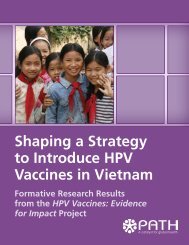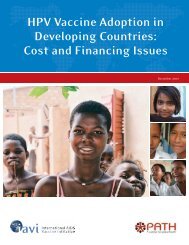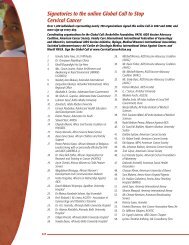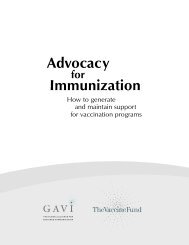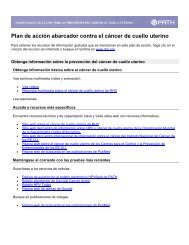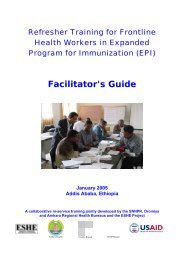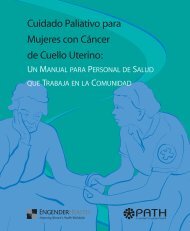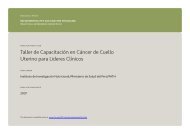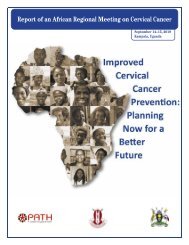Evidence of Support for Improved Cervical Cancer Prevention ... - RHO
Evidence of Support for Improved Cervical Cancer Prevention ... - RHO
Evidence of Support for Improved Cervical Cancer Prevention ... - RHO
You also want an ePaper? Increase the reach of your titles
YUMPU automatically turns print PDFs into web optimized ePapers that Google loves.
Mexico<br />
DECLARATION <strong>of</strong> the MEETING<br />
TOWARDS COMPREHENSIVE CERVICAL CANCER PREVENTION AND CONTROL<br />
Mexico City 12-13 May, 2008<br />
Recognizing that cervical cancer is one <strong>of</strong> the most common causes <strong>of</strong> death among women in Latin America and<br />
the Caribbean (LAC);<br />
That 33,000 women die each year <strong>of</strong> cervical cancer in Latin America and the Caribbean.<br />
That it is estimated that, if this trend continues, the number <strong>of</strong> deaths from cervical cancer will double by 2030.<br />
That it primarily affects vulnerable populations such as poor women and indigenous populations.<br />
Expressing concern <strong>for</strong> the high burden <strong>of</strong> this disease, with the highest mortality rates in the world and its<br />
economic impact in Latin America and Caribbean.<br />
That now we know HPV causes virtually 100% <strong>of</strong> cervical cancers.<br />
That today there are vaccines against HPV, which <strong>of</strong>fer great hope towards the prevention <strong>of</strong> 70% <strong>of</strong> the<br />
infections by this virus.<br />
That the primary limitation <strong>for</strong> its use is the high cost.<br />
That vaccines against HPV do not replace screening programs, diagnostics and treatment.<br />
That with the introduction <strong>of</strong> this vaccine we have an opportunity to strengthen prevention and comprehensive<br />
control through improving coverage and quality <strong>of</strong> screening, diagnostics, and treatment services.<br />
The participants resolve to:<br />
Promote the integration among programs responsible <strong>for</strong> immunization, cancer prevention and control, and<br />
adolescent and reproductive health with the goal <strong>of</strong> strengthening ef<strong>for</strong>ts toward the prevention and control <strong>of</strong><br />
cervical cancer.<br />
Take the opportunity with the introduction <strong>of</strong> the vaccine against HPV to strengthen sexual and reproductive<br />
education, training <strong>of</strong> personnel, as well as cancer screening services, diagnostics and treatment.<br />
Continue considering immunization programs as a regional public good with high political priority.<br />
Consider the introduction <strong>of</strong> a vaccine against HPV based on technical, programmatic and operational criteria <strong>of</strong><br />
individual countries, taking into consideration the need to strengthen the cold chain, epidemiological surveillance<br />
systems, and the laboratory network in countries.<br />
Work together and with PAHO's Revolving Fund to obtain af<strong>for</strong>dable prices <strong>for</strong> HPV vaccines so that all the<br />
countries in the region can introduce the vaccine in their national immunization programs as soon as possible.<br />
Generate mechanisms and negotiating processes with high-level financing stakeholders at the national level,<br />
which will ensure the sustainability <strong>of</strong> vaccination programs, prevention and control <strong>of</strong> cervical cancer.<br />
Country Participants<br />
Argentina<br />
Barbados<br />
Brazil<br />
Canada<br />
Chile<br />
Colombia<br />
Costa Rica<br />
Cuba<br />
Dominican Republic<br />
Ecuador<br />
El Salvador<br />
Guatemala<br />
Honduras<br />
Jamaica<br />
México<br />
Nicaragua<br />
Panamá<br />
Paraguay<br />
Peru<br />
United States<br />
Venezuela


